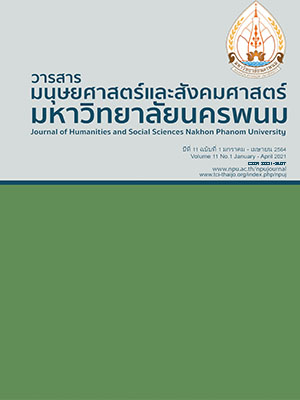Knowledge Management to Intellectual Capital of Business Organizations in Thailand
Main Article Content
Abstract
Knowledge management is one of the management theories to enhance competitive levels of organizations. This management focuses on the process of managing intellectual property. Recently, our society is turning to a knowledge-based economy that influences organizations to emphasize more on knowledge management as valuing the intellectual capital of all employees. This intellectual property is the primary asset that contributes to the companies’ growth through the knowledge management process and system development regarding intellectual property and resources of the companies. This article aims to illustrate definitions, significances, objectives, and evolution of knowledge management concerning a change of an information society to a knowledge society, knowledge management and capacity enhancement of organizations, knowledge management and characteristics of modern organizations. Moreover, the article focuses on the process and steps of managing knowledge, innovation management of organizations, and intellectual property management of organizations. All in all, this is to let students, executives, or people who are interested in this issue visualize the benefits of intellectual property management that might contribute to the success, survival, and competitive level improvement of business organizations in Thailand sustainably.
Article Details
References
Brian, W. (1991). Knowledge’s in Context. Science, Technology, & Human Values, 16(1), 111-121. https://doi.org/10.1177/016224399101600108
Choo, C. W. (2002). Information Management for the Intelligent Organization: The Art of Scanning the Environment. 3rd ed. Medford NJ: Information today INC.
Cumming, s. & Worley. (2005). Organizational Development and Change. Westport: Minneapolis.
Denham, S. A. (1993). Maternal Emotional Responsiveness and Toddlers' Social‐Emotional Competence. The Journal of Child Psychology and Psychiatry, 34(5), 715-728. https://doi.org/10.1111/j.1469-7610.1993.tb01066.x
Jashapara. (1993). The Competitive Learning Organization: A Quest for the Holy Grail. Management Decision, 31(8), 52-62.
Ketthat, S. (2000). National vision and strategy in science and technology of Thailand. Bangkok: National Science and Technology Development Agency.
Liebowitz, J. (1999). Key ingredients to the success of an organization’s knowledge management strategy. Knowledge and Process Management, 6(1), 37-40.
Makasiranon, V. (2008). Executive Scriptures: Learning Organization to TQM. Bangkok: Expernet.
Malone, M. (1997). Intellectual Capital. New York: Harper Business.
Meechork, M. (2011). Intellectual Capital for Thai Student Development. Journal of Education, 13(2), 139-148.
National Science and Technology Development Agency. (2009). Knowledge Management. Prathumthani: National Science and Technology Development Agency.
Nonaka, I. & Takeuchi, H. (1995). The Knowledge-creating: How Japanese companies create the dynamics of innovation, Oxford: Oxford University Press.
Schein, E. H. (1993). Organizational Culture and Leadership. San Francisco: Jossey-Bass.
Skandia. (1996). Power of Innovation: Intellectual capital. Supplement to Skandia’s 1996 Interim Annual Report. Skandia. Stockholm.
Stewart, T. & Petrash, A. (1997). Intellectual Capital: The New Wealth of Organizations. New York: Doubleday.
Sveiby. (2001). A Knowledge-based theory of the firm to guide in strategy formulation. Journal of Intellectual Capital, 2(4), 344-358.
Thomas, G. (2001). In Search of Excellence-Lessons from America’s Best-Run Companies. London: Harper Collins Publishers.
Watkins & Marsick. (1993). Sculpting the Learning Organization. San Francisco: Jossey-Bass.
Withet, N. (2009). Knowledge Management. Bangkok: AR Business Press.
Wongprasert, C. (2017). Knowledge Management to Intellectual Capital. Khon Kaen : Khon Kaen University.
Yang, J.T. (2007). The impact of knowledge sharing on organizational learning and effectiveness. Journal of Knowledge Management, 11(2), 83-90.


